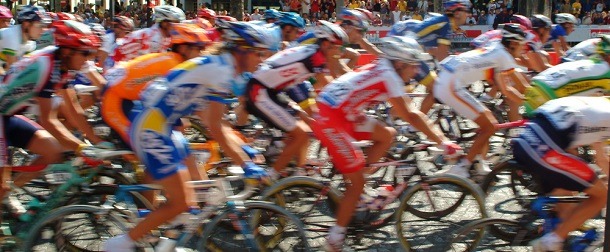Running from Saturday July 5th to Sunday July 27th 2014, the 101st Tour de France will be made up of 21 stages and will cover a total distance of 3,664 kilometres.
This annual bicycle race was first organized in 1903, and has run every year except for during the two World Wars. Initially situated only in France, as the Tour gained prominence its course was extended into nearby countries and now participants come from all over the world to ride for 21 days in an attempt to become the next wearer of the coveted Yellow Jersey or Maillot Jaune.
Whilst the Yellow Jersey is awarded to the overall time winner, there is also the Green Jersey for the highest number of sprint points, the Polkadot Jersey awarded to the winner of the King of the Mountains competition, the White Jersey for the best young rider, and the Rainbow Jersey which is worn by the current World Champion.
So, now that you’ve caught up on the history of the Tour’s 21 Stages, here is a list of 21 words to help you track the next champion!
1. Fred and Doris
This is how the more serious old timers like to refer to cycling newbies (if you are a Fred or a Doris, keep reading and you’ll soon sound like a pro!).
2. Aero bars
An extension to the handlebars which allows the rider to rest his elbows and benefit from improved aerodynamics, these are often found on time trial bicycles.
3. Peloton
The French word for ball or pack, this is the main group in a bicycle race and can also be referred to as the field, bunch, or pack. Riders in a group save energy due to the reduction in drag, which can be as much as 40% lower when in the middle of a well-developed group.
4. Alleycat
Alleycat races were initially organized by bicycle messengers or couriers, although with the recent boom in urban cycling they are now taken up by non-messengers too. Alleycats replicate the duties that a working messenger might encounter during a typical day, and often consist of previously undisclosed checkpoints which are listed on a manifest; racers visit each checkpoint to have their manifest updated and the first racer to return with a completed manifest wins.
5. Cadence
Also known as pedal rhythm, cadence depends on the cyclist’s pushing power, the bike’s friction with the ground, whipping winds, and the incline of the road. Everyone has a cadence sweet spot – find yours by shifting gears until pedalling power matches resistance.
6. Shifting
Shifting, or transitioning between gears, allows cyclists to maintain constant cadence despite changes in resistance or incline. Cyclists can spend much of their time shifting the rear gears in search of their cadence sweet spots.
7. Clydesdale
An affectionate nickname for larger riders, weighing 90kg or more.
8. Squirrels and turkeys
Squirrels are unstable or hesitant riders who can’t maintain a steady route, while turkeys are inexperienced riders. Watch out for this wildlife to avoid our next term…
9. Eat it
Slang for crash!
10. Echelon
A riding formation used by a group of cyclists when there’s an oncoming side wind. Riders stagger themselves to form a diagonal line across the road and shelter one another from the wind, therefore saving energy and maintaining their pace.
11. False flat
A section of road that appears flat but is actually uphill, or a stretch on a long hill that looks flat and tricks you into thinking you’ve reached the top when there’s still more climbing to be done.
12. Grom
A ‘grom’ or ‘grommet’ is any young, up-and-coming rider, usually under 15 years-old, who already possesses considerable skill.
13. Maillot Jaune
The French for Yellow Jersey, what the leader and winner of the Tour de France wears.
14. Bacon
This cut is much less tasty than the sandwich filler, and instead is slang for scabs, cuts, scars and other crash related scrapes.
15. Yellow line rule
This bike race safety precaution means that cyclists cannot cross the yellow centreline in the middle of the road. Punishment for breaking this rule can include a time penalty, being relegated to the back of the group or even disqualification.
16. Musette
This pouch with a shoulder strap is stuffed with food and handed to racers as they pass through the feed zone – a designated area on the course where managers can give provisions to their racers as they fly by.
17. Shimmy
Also called ‘speed wobble’, this is a very dangerous side-to-side front-end oscillation caused by a damaged bicycle or road conditions. It starts off as a slow wobble and quickens until it can lead to riders losing control and crashing – to stop a shimmy, clamp your knees against the top tube and gradually slow down.
18. Snap
Strong sprinters are said to have excellent snap: the ability to rev the pedals to accelerate quickly.
19. Blow up
A rider who has gone into oxygen debt and can no longer maintain pace is said to have blown up, popped, exploded or detonated. This is a more temporary condition than cracking or hitting the wall.
20. Wash out
When a cyclist’s tires hit loose gravel or dirt and slide out from underneath the frame, in cases like this it can be best to bail – to ditch your bike before a crash.
21. Breakaway
To ride away from the peloton in an effort to win a race! However, as a peloton can ride much faster than an individual (due to decreased drag) breaking away is often a futile effort and leads to exhaustion!




collins_dictionary_official
The home of living language. #wotd #wordlovers #collinsdictionary
Read our word of the week definitions and blog posts: